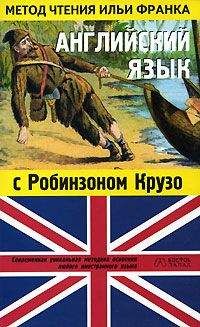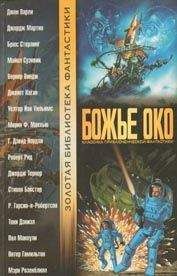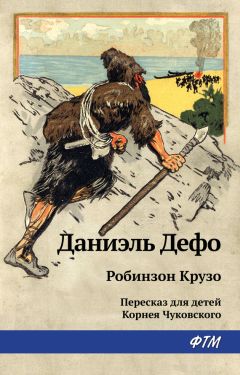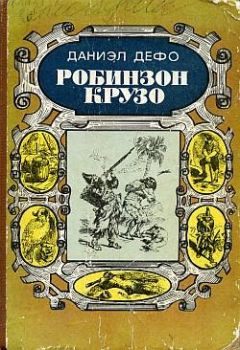James Baldwin - Английский язык с Робинзоном Крузо (в пересказе для детей)
I was so tired that I soon fell asleep and did not waken once until the next morning.
I went up a little hill close by the shore, and looked around to see what part of the island I was in.
To my right I saw some well-known trees which I had visited when I was exploring the island. Then I knew that I was only a little way from my summer house and that I could reach it easily by walking.
I was sick of the sea, and I thought that nothing would be so pleasant as a few days in my quiet bower.
So, with my umbrella over my head, I started across the country. It was a hot day, and I walked slowly.
I stopped often to rest, and did not reach my summer house until it was growing dark.
I saw that everything was standing just as I had left it; for I always kept it in good order.
As soon as I got over the fence, I sat down to rest; and I was so tired that I fell asleep.
Then, all at once in the darkness, I heard a voice calling me, "Robin, Robin, Robin Crusoe!"
I was so full of sleep that I did not wake up at once. But between sleeping and waking I could hear somebody saying, "Robin Crusoe, Robin Crusoe!"
I wondered who it could be, but I was still more than half asleep.
Then the voice screamed in my ear, "ROBIN CRUSOE!"
I sprang to my feet. I was frightened almost out of my wits. Who in the world could be speaking my name in that place?
No sooner were my eyes well open than I saw in the dim light of the moon my Poll Parrot sitting on a post quite close to my shoulder.
"Poor Robin Crusoe," he said. "Poor Robin Crusoe."
He was looking down at me as though in pity.
He was but repeating the words I had taught him. I knew that he was glad to see me, as I also was glad to see him.
I let him sit on my thumb as he often did at home. He rubbed his bill on my face and kept saying: "Poor Robin Crusoe! Where are you? Where have you been?" and other words that he knew.
I wondered how the bird had come to this place, for I had left him at the castle. I asked him; "Why are you here, Poll?"
But he answered me only by saying: "Poor Robin Crusoe! Where have you been?"
I surely believe that the bird loved me.
In the morning I carried him with me back to my castle.
As for the canoe, I would gladly have brought it back to its place in the little river. But I was afraid of being caught again in the furious currents; and so I left it in the safe cove on the other side of the island.
I AM HAPPY AS A KING
(я счастлив как король)
I HAD now had adventures enough for a time (у меня было достаточно приключений пока = уже достаточно приключений), and I felt very happy to be at home with my goats and other pets (и я чувствовал себя очень счастливым быть дома с моими козами и другими питомцами).
A few years before (несколькими годами ранее), I had started with keeping three kids that I had caught (я начал с содержания трех козлят, которых я поймал; to catch — ловить). Now I had a herd of three and forty goats (теперь у меня было стадо из сорока трех коз), some of them young, some old (некоторые из них /были/ старые, некоторые молодые).
I kept them in five little fields that I had fenced (я содержал их в пяти маленьких полях, которые я огородил; to keep — держать, не отдавать; хранить; сохранять; беречь; содержать; держать /животное/), at the foot of my castle hill (у подножия моего холма с замком). I never had any lack of meat and I had plenty of milk, too (у меня никогда не было недостатка в мясе и и было к тому же много молока).
Indeed (на самом деле), I had gone so far as to set up a little dairy (я зашел так далеко, что устроил небольшую маслобойню; to set up — воздвигать, устанавливать, ставить; основывать, открывать /дело, предприятие и т. п./), and sometimes my goats gave me a gallon or two of milk in a day (и подчас мои козы давали мне галлон[7] или два молока в день).
Before coming to the island I had never milked a cow (до того, как я прибыл на остров, я никогда не доил корову), much less a goat (тем более: «гораздо менее» козу = не говоря уж о козе). I had never seen butter made (я никогда не видел, как делается масло), or even cheese (или даже сыр). But I learned how to do everything of the kind (я научился, как делать все эти вещи; kind — сорт, разновидность; разряд; вид, класс, род). And now I had more butter and cheese than I could eat (и теперь у меня было больше масла и сыра, чем я мог съесть).
After dinner it was my custom to go out for a stroll (после обеда у меня была привычка выходить на прогулку). How proud I was of my little kingdom (как я гордился: «как горд был» своим маленьким королевством)!
If you had seen me then (если бы вы увидели меня тогда), you would not have laughed (вы не посмеялись бы). You would have been frightened (вы испугались бы). For a stranger-looking fellow you never saw (ибо более странно выглядящего человека вы никогда не видели; fellow — приятель, товарищ, коллега, собрат; /разг./ человек, парень).
Be pleased to take a picture of me (пожалуйста, «возьмите» описание меня = вот вам…).
On my head was a big cap made of goatskin (на моей голове была большая шапка, сделанная из козьей шкуры). It was very tall and without shape (она была очень высокая и без формы). A flap hung down from the back of it to keep the rain off my neck (лоскут свисал с нее назад, чтобы оберегать шею от дождя).
I wore a short jacket of goatskin (короткая куртка из козьей шкуры) and a pair of knee breeches of the same (и бриджи из того же /материала/).
I had neither stockings nor shoes (у меня не было ни чулок, ни туфель/башмаков). But I wore around my legs and feet some queer things (я носил вокруг ног и ступней странные вещи; to wear — носить /одежду, обувь/) that I called buskins (которые я называл баскинами; buskins — высокие башмаки со шнуровкой на толстой подошве). They were made of goatskin, too (они были сделаны из козьей шкуры, также), and were of great use when walking among briers or stones (и были очень удобны при ходьбе между кустами и камнями; brier — колючий кустарник).
Around my waist I had a broad belt of rawhide (вокруг талии у меня был широкий пояс из сыромятной кожи; raw — сырой; необработанный; hide — кожа, шкура). I had no need of sword or dagger (мне не требовался ни меч, ни кинжал); and so I carried in this belt a little saw and a hatchet (и потому я носил в этом поясе маленькую пилу и топорик).
Another belt, which hung over my shoulder (другой ремень, который висел на плече), held my powderhorn and shot pouch (держал рог с порохом и мешочек с дробью).
On my back was slung a basket (на спине висела корзина; to sling — бросать, швырять; вешать через плечо). On my shoulder was my gun (на плече было мое ружье). Above my head I carried my great clumsy, ugly umbrella (над головой я носил мой большой грубый, уродливый зонт; clumsy — неловкий; топорный, неаккуратно сделанный).
My face was as dark as mahogany (мое лицо было темным, как красное дерево). It was tanned by the sun and browned by the hot winds (оно было смуглым от солнца и загорелым от горячих ветров; to tan — дубить /кожу/; обжигать кожу /о солнце/).
My beard was at one time a yard long (борода была одно время ярд[8] длиной). But I soon grew tired of it (но я вскоре устал от нее = вскоре она надоела мне) and cut it pretty short (и я обрезал ее довольно коротко; to cut — резать). Yet even then it looked grizzly enough (и все же даже тогда она выглядела довольно седой; grizzly — серый; с сильной проседью), I assure you (уверяю вас).
It is not a very handsome picture (не очень красивая картинка), is it (не так ли)?
But do not blame me (не вините меня). I dressed as well as I could (я одевался так, как мог). I kept myself clean (я содержал себя в чистоте). I tried to be worthy of respect (я старался быть достойным уважения), even though no one saw me (даже хотя никто не видел меня).
I looked over my little kingdom (я смотрел на/осматривал мое королевство) and was proud and happy (и был горд и счастлив).
You would have laughed to see me and my family when dinner time came (вы бы посмеялись, видя меня и мое семейство, когда приходило время обеда).
First there was myself (во-первых, вот я сам), Robinson Crusoe, king of the island (король острова). I was the lord of everything I could see (я был повелителем всего, что я мог видеть).
Then, like a king (затем = во-вторых, подобно королю), I dined alone (я ел один), with my servants looking on (со слугами, смотрящими на /меня/).
No one was allowed to talk to me but Poll Parrot (никому не было позволено говорить со мной, кроме попугая Попки), who sat on the back of my chair (который сидел на спинке стула) and waited for what I would give him (и ждал того, что я ему дам).
My dog was now so old and feeble (мой пес был теперь столь старым и немощным) that he could hardly stir (что едва мог пошевелиться). He sat always at my right hand (он сидел всегда по правую руку от меня) and wagged his tail if I did but snap my finger (и вилял хвостом, стоило мне щелкнуть пальцем: «если я лишь щелкал пальцем»).
My two cats waited (мои две кошки ждали), one on each side of the table (одна на каждой стороне от стола = каждая со своей стороны стола), to see what I would give them (ожидая подачки: «чтобы увидеть, что я им дам»).
These two cats were not the same that I had brought from the ship (эти две коши были не те же самые, которых я принес с корабля). Those were dead (те умерли: «были мертвы»), long ago (/уже/ давно), of old age (от старости: «от старого возраста»). But they had left many kittens (но они оставили много котят; to leave — оставлять).
Indeed (в самом деле), there had come to be so many cats that I was forced to drive them away (оказалось: «случилось быть» так много кошек, что я был вынужден выгнать их; to drive — гнать; to drive away — гнать прочь, выгонять, отгонять). All but these two had gone into the woods (все, кроме этих двух, ушли в леса) and become very wild (и стали очень дикими).
adventure [ǝdˈventʃǝ], young [jʌŋ], old [ˈǝuld], dairy [ˈdeǝrɪ], gallon [ˈɡælǝn], stroll [ˈstrǝul], kingdom [ˈkɪŋdǝm], picture [ˈpɪktʃǝ], mahogany [mǝˈhɔɡ(ǝ)nɪ], assure [ǝˈʃuǝ], servant [ˈsǝ:vǝnt], dead [ded], ago [ǝˈɡǝu]




